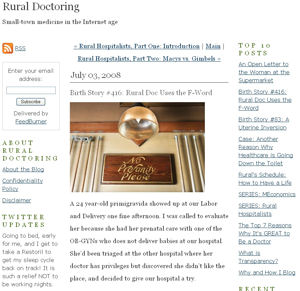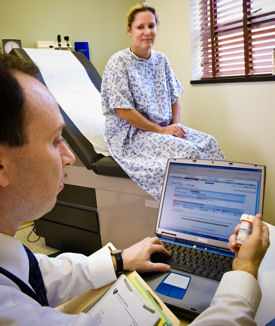Hospitalist doesn't hold back on blog about rural medicine
Theresa Chan, MD, really knows how to put her money where her mouth is.
Theresa Chan, MD, really knows how to put her money where her mouth is.
While most doctors will happily discuss issues affecting professional compensation—declining reimbursement, medical school debt or malpractice insurance—Dr. Chan, a hospitalist in rural Northern California, has taken the conversation one step further on her blog, Rural Doctoring, by posting her monthly personal income and expenses online.

“I wanted to disabuse the notion, rampant in popular culture, that we are all egotistical and money-grubbing, and instead give a more realistic portrait of how doctors spend their money,” said Dr. Chan in an interview. “It's not like I own an Airstream.”
There are six posts in all devoted to her personal finances, cleverly dubbed the “MEconomics series.” It's just one example of how open the 40-year-old Californian is on her blog, which she began last May as a way to document the challenges of being a small-town doctor, and to show how medical policy decisions play out in a rural setting.
Dr. Chan's openness is also evident in her “Rural Hospitalists” series, in which she profiles and compares hospitalist programs in a rural community like hers. While she creates composite portraits of hospitals and fictionalizes their identifying information—naming them “Macy's” and “Gimbels,” and not revealing their location, for example—she also shares enough about the inner workings of the facilities that her friends have begun to fear she'll get in trouble.
Yet being honest about details and experiences is a very deliberate decision, Dr. Chan said, and was a main driver in starting the blog.
“There's a lot of talk out there about the need for greater transparency in the way healthcare is delivered, from CMS policy statements to disclosure of medical errors,” she wrote in July. “And yet the more transparency everybody demands, the more baroque and inaccessible the language to discuss these matters becomes. … Why not take a stand against this trend by writing in detail about the work we do and where we do it?”
Not everything on the blog is so serious, however. Recent posts have included an open letter to patients who approach her at the supermarket or in restaurants for medical advice (“I find the intimate details of your vaginal discharge a bit too much to stomach when I'm waiting in line at the salad bar,” she wrote) and an anecdote about the strategic use of the “f-word” to get a whiny patient in labor to push harder.
The birth stories are, in fact, some of her favorite to write, and have inspired Dr. Chan to consider taking on an oral history book project on home births, which are popular in her community.
“I'm very interested in the psychological arc of labor,” Dr. Chan said. “I've done about 500 deliveries, so I've seen a lot.”
Another upcoming project—probably another series on the blog—will focus on the experiences that led Dr. Chan to leave primary care in 2008 and become a hospitalist. It was a heart-wrenching decision for someone who had dreamed of, and trained for, a life in primary care. But her residency experience with migrant farm worker patients in California's Central Valley was very different from what she encountered when she moved to the state's far north for her first job.
“The migrants, who were mostly Mexican, grew up in a culture where they respected doctors and were grateful for care. Where I am now, there is a strong culture of disability, and of pain management,” Dr. Chan said. “I felt like a probation officer when I worked in primary care here: I had to make narcotic contracts, count pills and do drug testing.”
While she does miss some aspects of primary care, Dr. Chan enjoys the diagnostic challenge of being a hospitalist. She even likes being on call.
“I prefer being in a hospital where, if someone is sick, I can decide that the person needs most of my attention, rather than being artificially driven by a clinic's schedule,” Dr. Chan said. “So even if I am there until 2 a.m. dealing with a crisis, it feels rewarding and challenging to me.”





